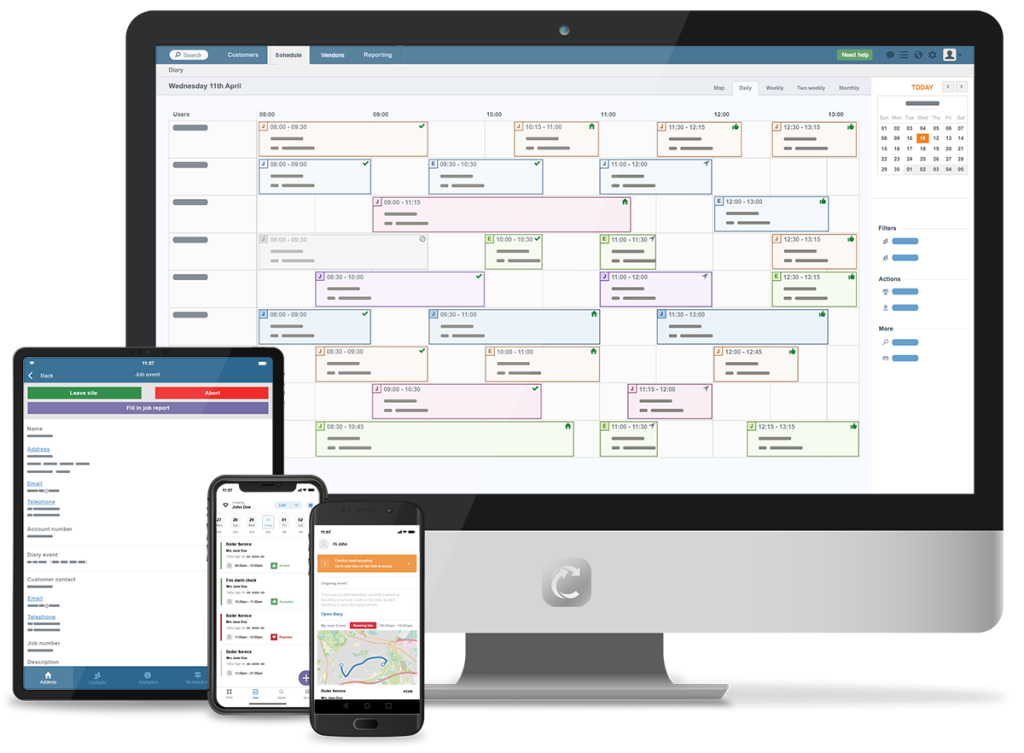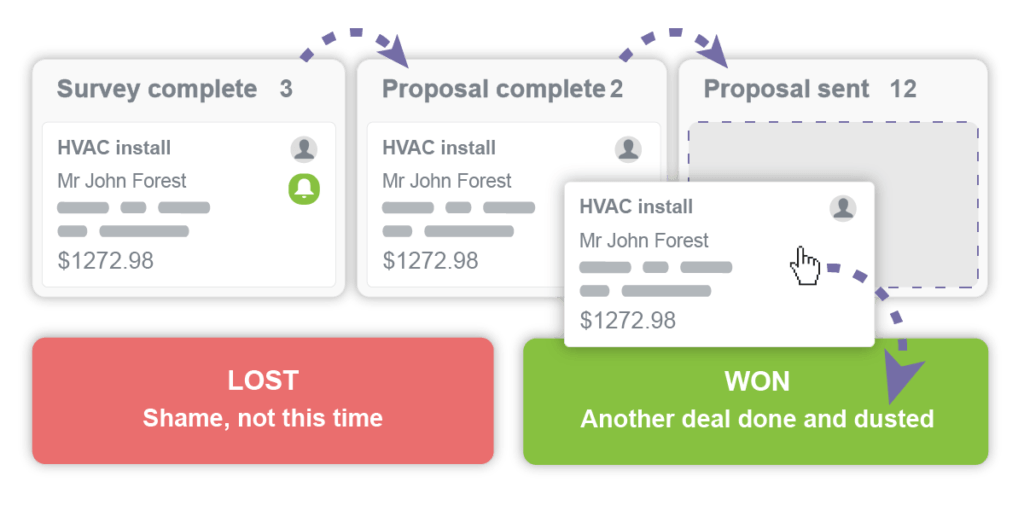
Easy Ways to Get More HVAC Leads
It takes time and effort to generate HVAC leads, and it can feel especially difficult during the slower months. What you want is busy year-round!
Whether over-the-phone, or on-site, Commusoft's all-in-one HVAC software helps HVACR businesses master their quality of service and exceed customer expectations.






2353960
Jobs created in 2024
508756
Customers added in 2024
1567853
Invoices raised in 2024




Rather than contacting the office, building managers and other organizations you serve can access a personalized log-in portal. Any time of day, they can review live job updates, attached files, invoices, and more, for all their properties. Further, they can book appointments whenever they need.
Want to exceed customer expectations? As soon as your team begins to travel to the job site, your customers will automatically be notified with an on-the-way message and technician tracking portal link. Customers will know exactly who to expect and when.
Collecting customer responses after each appointment allows your team to understand where you excel and what can be improved. Ultimately, customer feedback ensures you can secure more referrals and better reviews, so you can win new and repeat business.

Your technicians shouldn’t struggle to find the customer data they need. From the job site, they can have access to customer and job details, available inventory, and much more, via their mobile app. Supporting techs in the field has never been easier.
Your technicians want to focus on their work in the field, not the tedious admin processes behind them. Commusoft’s HVAC mobile app automatically updates the office, with travel and arrivals, parts and invoice requests, completed forms, and so much more. Your entire team will be in sync no matter what!
Completing inspection forms is a considerable part of your mechanical HVACR team’s days. The best HVAC software streamlines this process, allowing your technicians to efficiently complete forms from the field. Further, your team can create customized forms for each HVAC asset, service type, or more; it’s up to you.

Your sales team can make the best recommendations with information gathered from the field. They can advise customers on how to limit costs, and whether a repair or full replacement is the best choice. In addition, your team can use this opportunity to introduce service maintenance plans for the future.
Whether you want to expand your service territory, win higher-value deals, or both, an organized selling process is essential. Further, a knowledgeable team, and professionally offering the best HVAC services ensure you can consistently win the business you want.
Proving your dependability is essential. A seamless connection between winning a sale, and booking the appointment proves to customers you care. Moreover, efficiently completing services means your team can get paid faster.
Equipping your entire team with powerful heating software means enabling them to exceed your commercial customers' high standards. With streamlined installation, contracted maintenance, and repair workflows, your team can go above and beyond every time!
Gather valuable site data
Following an initial inquiry, it's important to schedule an estimating appointment to inspect the job site. Here your HVAC expert can assess the scope of the job, and begin to build a list of recommendations. Further, while on site, they can identify any other issues too. Commusoft Sales makes it easy for your sales team to gather and record valuable customer and job information directly from the site. With this data on hand, your sales team can build custom professional proposals.
Work from custom templates
Your sales team can create option templates for each HVACR appliance you sell, such as air conditioners, heaters, or refrigeration units. These can be customized with live parts pricing, labor rates, margins, and more. This information makes it easy to understand which service types have the biggest impact on company revenue. Further, your team can including upselling options, such as air filters, fans, and other air quality accessories. Presenting prospective customers with the best recommendations from your site inspection make it easier for your salespeople to win the jobs that matter most to you!
Pivot when customers need
Every commercial HVAC business deals with last-minute cancellations and emergency call-outs. When circumstances change, your customers depend on a coordinated office and field response. This is how the best teams stand out. An intelligent scheduling software weighs technician schedules, travel times, necessary skills such as furnace repair, and suggests appointments from most to least efficient, all in mere seconds. Your admin simply selects the best option, and your technician's mobile app automatically updates with everything they need to know. Your team can respond to changes with no stress!
Fulfill service agreements
Contracted work is foundational for industrial HVAC works. Commusoft makes it easy for your team to exceed agreements. Further, personalizing maintenance schedules and contracts is a great way to prove you care. Your team can set planned preventive maintenance (PPM) schedules and benefit from automated PPM job creation, service task lists, and asset-by-asset service plans. When meeting service level agreements is effortless, you can scale your heating and cooling business with ease.
Let clients help themselves
When phone lines are busy, or if they need access to job data outside of working hours, a personalized customer login portal has everything commercial customers need. From job statuses, reports, invoices, safety forms, and more, customer portals set your clients up for victory. This system relieves admin burdens without needing to hire more team members. Further, with this solution, clients can request appointments too; your team can always be there when customers need you!
Create bespoke invoices
From retrofitting appointments, planned inspections, and emergency call-outs, your team likely serve multiple HVAC assets for your mechanical clients. Rather than send a new invoice following each appointments, your customers will appreciate consolidated invoices. Further, with Commusoft, your admins can send customized monthly, or quarterly invoices to clients via a secure statement portal. When it's most convenient for them, customers can review and digitally pay. There's no need for them to reach our to admins, this system guarantees your business is open to accept payments 24/7!
HVAC software is a digital solution that allows HVACR businesses to manage every aspect of their daily operations online.
Whether your business repairs heaters, maintains ventilation systems, retrofits air conditioners, services refrigeration units, or all of the above, Commusoft can handle it. Tracking your appointments, securely storing company data, and organizing your entire team has never been easier.
Basic HVAC business management platforms offer customer database software, job scheduling software, and reporting dashboard software. But our HVAC management software takes it further; our clients can take appliance management to the next level with asset maintenance software, optimize their field service inventory management, and revamp customer communications with personalized alerts and notifications. With Commusoft, you can easily oversee your entire HVACR business, manage your office and remote teams, organize company finances, and more!
The future of field service is digital; and Commusoft ‘s heating software is here to make the transition from paper to digital seamless.
Ready to see Commusoft’s HVAC software in action? Schedule a call with our team today!
HVAC scheduling software allows your customers can book online and the appointment will go straight into your technicians’ calendars, saving your office staff countless hours.
Figuring out how to best plan each technician’s day is a nightmare for many admins. That’s why Commusoft’s HVAC management software is powerful and flexible, offering a variety of booking options. Prefer the phone? Easily keep track of calls, records, and easily add new jobs on the fly with Commusoft!
Further, Commusoft offers unmatched service contract management software, enabling teams like yours to effortlessly manage agreements with varying risk, increase the number of clients under contract, and create custom recurring payment cycles, all without needing to hire. This system ensures all contracted appointments are scheduled in advance, and last-minute call-outs can be accommodated.
Want to take scheduling even further? Use our job scheduling software and discover how intelligent scheduling can help your dispatchers pick the best team member and time for any given appointment. Don’t worry, you can always manually schedule and arrange appointments too – you’re in charge.
Absolutely; whether you’re just getting started, or are rapidly expanding, Commusoft was built specifically for growing mechanical HVAC businesses.
Learn more about Commusoft’s different plans!
Not sure how to choose the best HVAC CRM for your team? We’ve gathered six questions to ask during your search!
A digital HVAC management system helps HVACR businesses business grow by freeing up resources to save time and money on processes such as job scheduling, team management, and invoicing.
Commusoft’s flexibility and automation sets us apart – we’ll help you provide the best and most consistent customer experience possible. This can increase referrals and return business. Further, with Commusoft constantly working in the background, your team can pay attention to larger tasks and make confident, data-backed business decisions.
Download your free guide here to automating your HVAC business!
With Commusoft’s HVAC service management software, you can create and attach detailed records of assets to jobs and properties.
Further, your team can store the history of any work that’s been done on the asset, and you can store notes such as the location of the asset so it’s easy to find once on site. Nothing falls through the cracks!
We understand that asset maintenance is a significant part of HVACR daily workflows. Learn more about how Commusoft’s asset maintenance software can help your team stay on top of customer appliances!
Yes, free trial versions of our platform are available upon request, following an online demonstration of the platform with one of our product experts. Trials are a great opportunity to further evaluate Commusoft.
Learn more about Commusoft’s Free Trial!

It takes time and effort to generate HVAC leads, and it can feel especially difficult during the slower months. What you want is busy year-round!

This ROI calculator shows you how much time and money automated scheduling and route optimization could generate for you.

"There is no way we could run our business efficiently and effectively... we just simply could not run it without Commusoft - it would be impossible."